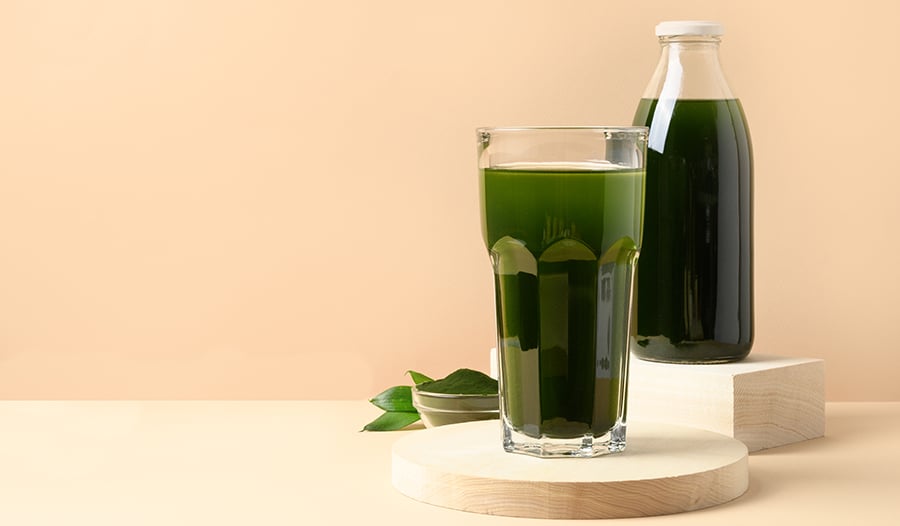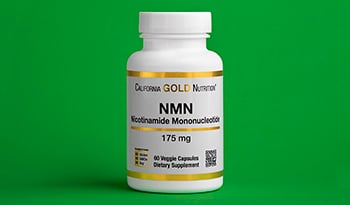What Are the Health Benefits of Greens Powder?

With the abundance of green powders on the market, you’ve probably seen advertisements for various types—and may have even tried some yourself. Many introduce green powders into their wellness routine to improve health, but what exactly can green powder do for you?
Green powders claim benefits ranging from improved overall wellness to enhanced immunity to digestive support. Some that contain caffeine tout increased energy, and most green powders contain a variety of essential vitamins and minerals that contribute to daily micronutrient needs.
Read on to learn if green powders’ benefits stand up to their claims, who may benefit from taking them, and potential side effects to look out for.
What Is Greens Powder?
Green powders are comprised of a variety of plant-based ingredients, like greens, vegetables, and fruits. Many also contain targeted ingredients, like fiber, probiotics, digestive enzymes, or adaptogens (substances that help the body manage stress).
With their wide range of ingredients and touted benefits, daily green powders have become a popular supplement that can support health in many ways. In fact, green powders are one of the most popular daily supplements consumed by adults. They are most beneficial when used along with a healthy, well-rounded diet that includes plenty of fresh fruits and vegetables.
The recommended serving size for green powders is often one to two scoops, or about one to two tablespoons. This varies by brand, so it’s important to note the suggested serving size on the nutrition facts panel before adding a green powder—or any supplement—to your routine.
For a simple way to add greens to your diet, simply mix green powder with water and enjoy. Also, try adding green powder to your favorite smoothie recipe or combine it with another liquid, like coconut water or tea. You’ll benefit most from green powder when you take it consistently, so choose an easy way to prepare it as part of your daily routine.
Do Green Powders Work?
With so many health claims and positive anecdotes surrounding green powders, adding them to your morning routine may seem like a no-brainer. However, as with any supplement, it’s important to look at science-based information before you decide if green powder is a good fit for your current health, goals, diet, and lifestyle. Research suggests green powders do offer health benefits, and they may be worth adding to your diet.
Potential Greens Powder Benefits
So, are powdered greens good for you? Green powders provide many essential nutrients naturally found in fruits and vegetables. While meeting your nutrient needs from whole foods rather than supplements is ideal, green powder can help fill any nutritional gaps in your diet, ensuring you get adequate amounts of vitamins and minerals.
Nutrients commonly found in green powders include vitamins C and A, which support a healthy immune response. While this benefit alone may warrant daily supplementation, research supports several additional potential benefits of using green powder, including decreased inflammation, improved energy, and healthier blood pressure levels.
Less Inflammation
While some inflammation—like a swollen ankle from an injury—may be noticeable and uncomfortable, other forms of inflammation are less obvious. This is a more dangerous form of inflammation, which, when prolonged, can lead to chronic inflammation. In fact, diseases like cardiovascular disease, diabetes, and autoimmune conditions are associated with chronic inflammation.1 Luckily, green powders may be able to reduce the amount of inflammation in your body.
Research suggests probiotics can reduce systemic inflammation, lowering the risk of certain diseases.2 Not all green powders contain probiotics. If you aim to reduce inflammation, look at the ingredient list and choose a green powder that contains probiotics.
Along with regular use of a probiotic green powder, certain dietary changes can help reduce inflammation within the body. These include reducing the amount of added sugar you consume. Added sugar is found in many foods and drinks but is most commonly associated with candy, baked goods, soda, and other sweetened drinks. To reduce consumption of added sugars, try low-calorie sugar alternatives like stevia and monk fruit.
Eating less red and processed meats may also help reduce systemic inflammation. This means less steak, bacon, and sausage and more lean meat, like poultry and fish. Canned fish is a convenient swap that is rich in omega-3s, which may also help lower inflammation. Similarly, plant-based protein sources, including some nuts and seeds, contain omega-3 fats that may reduce inflammation.
Increased Energy
Green powders may also help improve energy levels. While some green powders owe their energy-boosting properties to the caffeine they contain, swapping your morning cup of sugar-loaded coffee for a green powder drink may be a healthier way to increase energy.
In one study, women who used a daily green powder that included green tea extract reported significantly higher energy levels compared to those taking a placebo.3 Other potential green powder benefits, like improved digestion and enhanced immunity, may also increase energy levels.
Lower Blood Pressure
Many factors, including an unhealthy diet, excess body weight, stress, and alcohol and tobacco use, can increase the risk of high blood pressure. When high blood pressure goes uncontrolled for an extended period of time, the risk of other diseases, like kidney problems, heart attack, stroke, and aneurysm, increases.
Managing your lifestyle is essential for maintaining healthy blood pressure levels. Taking a daily green supplement may be one way to reduce the risks associated with hypertension. In fact, in one study, people with hypertension who took a green powder mix for 90 days had significantly lower systolic and diastolic blood pressures compared to those who didn’t consume the powder.4
Along with taking a green supplement, swapping some of the salt in your diet for a low-sodium alternative may also help improve blood pressure levels. Introducing more potassium into your diet through supplements or more fruits and vegetables could also lower blood pressure. Lastly, when choosing packaged foods, opt for low-sodium options to support blood pressure control.
Potential Greens Powder Side Effects
Since green powders are comprised mainly of fruits and vegetables, they aren’t associated with dangerous or worrisome side effects. As a source of important nutrients, including antioxidants, taking green powder daily is a safe way to boost your nutrient intake.
However, green powder should not take the place of whole fruits and vegetables in your diet. While these powders contain many of the same nutrients found in produce, eating a wide variety of produce is the best way to ensure nutritional balance.
Still, taking any supplement could lead to excess intake of nutrients and pose a health risk. Focus on getting most of your nutrients through whole foods and follow the serving suggestion closely on any supplement, including green powders.
Toxins
One concern with taking a green supplement is possible contamination. Some green powders have been found to contain worrisome levels of lead and other heavy metals.5 To reduce the risk of contaminants in your green powder and other supplements, choose brands that are third-party tested. Third-party testing ensures the product has undergone additional lab testing to confirm the supplement’s contents.
Interference With Medication
Vitamin K is abundant in leafy green vegetables used to make green powders, like kale, spinach, and Swiss chard. While vitamin K is an important nutrient for health, it may interfere with some blood-thinning medications like warfarin. Vitamin K is involved in producing a protein needed for blood clotting. Excess intake of this nutrient could work against the desired blood-thinning actions of certain medications.
If you are taking a blood thinner, it is best to talk with your doctor before adding a green powder to your routine.
Will Greens Powder Work for You?
Green powders boast a long list of purported health benefits, including reduced inflammation, healthier blood pressure levels, and increased energy. They are also a source of vitamins, minerals, and other important nutrients.
Whether you seek relief from a specific ailment or strive for optimal health, green powder may be an excellent supplement to round out your wellness routine. Remember to choose brands that are third-party tested for purity. And always consult your healthcare team before adding a new supplement to your regimen to be sure it is safe for you and won’t interact with other medications you are taking.
References:
- Pahwa R, Goyal A, Jialal I. Chronic Inflammation. Pathobiology of Human Disease: A Dynamic Encyclopedia of Disease Mechanisms. Published online August 7, 2023:300-314.
- Lescheid DW. Probiotics as regulators of inflammation: A review. Functional Foods in Health and Disease. 2014;4(7):299-311.
- Boon H, Clitheroe J, Forte T. Effects of greens+: a randomized, controlled trial. Can J Diet Pract Res. 2004;65(2):66-71.
- Zhang J, Oxinos G, Maher JH. The effect of fruit and vegetable powder mix on hypertensive subjects: a pilot study. J Chiropr Med. 2009;8(3):101-106.
- ConsumerLab Finds Lead, Cadmium and Arsenic Contamination in Greens and Whole Foods Supplements. ConsumerLab.com. Accessed March 25, 2024.
DISCLAIMER:This Wellness Hub does not intend to provide diagnosis...
















































































 Table of Contents
Table of Contents















